Related Research Articles

New Zealand Rugby (NZR) is the governing body of rugby union in New Zealand. It was founded in 1892 as the New Zealand Rugby Football Union (NZRFU), 12 years after the first provincial unions in New Zealand. In 1949 it became an affiliate to the International Rugby Football Board, now known as World Rugby, the governing body of rugby union for the world. It dropped the word "Football" from its name in 2006. The brand name New Zealand Rugby was adopted in 2013. Officially, it is an incorporated society with the name New Zealand Rugby Union Incorporated.
Sport in New Zealand largely reflects the nation's colonial heritage, with some of the most popular sports being rugby union, rugby league, cricket, association football, basketball, horse racing and netball, which are primarily played in Commonwealth countries. New Zealand has enjoyed success in many sports, notably rugby union, rugby league, cricket, America's Cup sailing, world championship and Olympics events, and motorsport.

Rugby league in New Zealand dates to the beginning of the sport in England. New Zealand played an integral role in the history of rugby league football. Of all rugby league nations New Zealand was second only to England to compete in international competition.
Rodney Terry Latham is a former New Zealand cricketer. He played domestic cricket for Canterbury, and played four Tests and 33 One Day Internationals for New Zealand. He also played rugby union for Canterbury. He was born in Christchurch.
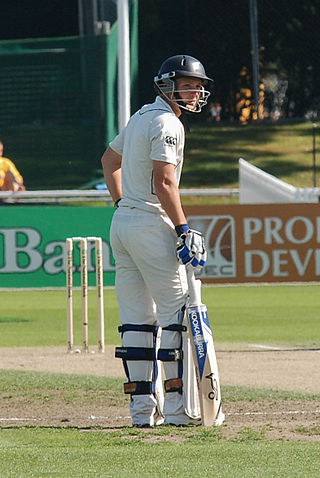
Bradley-John Watling, known as BJ Watling, is a South African-born former New Zealand international cricketer who has represented Northern Districts since December 2004. He made his Test debut in December 2009 and eight months later played his first One Day International. In 2012, Watling assumed the role of wicket-keeper in Tests.

FMG Stadium Waikato is a major sporting and cultural events venue in Hamilton, New Zealand, with a total capacity of 25,800. Four areas contribute to this capacity: The Brian Perry Stand holding 12,000, the WEL Networks Stand holding 8,000, the Goal Line Terrace holding 800 and the Greenzone can hold up to 5,000 people. The capacity can be extended, however, by temporarily adding 5,000 seats to the Goal Line Terrace area. The stadium, owned by the Hamilton City Council, regularly hosts two rugby union teams:
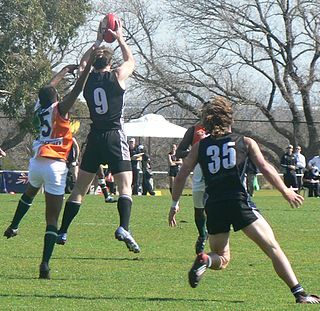
Australian rules football in New Zealand is notable as the first colony outside of Australia to take up the sport as early as the 1860s and was home to the first club formed outside Australia in 1876. The sport's official name was changed in 1890 to Australasian Football acknowledge New Zealand's participation and remained for some time even after the country was expelled from the Australasian Football Council. After a half century hiatus of organised competition, it has grown rapidly as an amateur sport. Today five of New Zealand's sixteen regions have organised competitions: Auckland ; Canterbury ; Wellington ; Waikato and Otago. A four-team national competition with a national draft has been contested at the North Harbour Stadium in Auckland since 2016 for men and 2019 for women. The national team were crowned International champions at the 2005 Australian Football International Cup and competed annually against the AFL Academy between 2012 and 2019. Since the 2010s the game has also grown at junior level among New Zealand schools as the "Hawks Cup".
Zimbabweans Britons are British people who were born in Zimbabwe or can trace their ancestry to immigrants from Zimbabwe who emigrated to the United Kingdom. While the first natives of the country then known as Southern Rhodesia arrived in Britain in larger numbers from the late-1960s, the majority of immigrants arrived during the 1990s and 2000s. The Zimbabwean community in the UK is extremely diverse, consisting of individuals of differing racial, ethnic, class, and political groups. There are a diverse mix of asylum seekers, professionals, investors, businesspeople, labour migrants, students, graduates, undocumented migrants, and others who have gained British citizenship.

The Zimbabwean diaspora refers to the diaspora of immigrants from the nation of Zimbabwe and their descendants who now reside in other countries. The number of Zimbabweans living outside Zimbabwe varies significantly from 4 to 7 million people, though it is generally accepted at over 5 million people, some 30 per cent of all Zimbabweans. Varying degrees of assimilation and a high degree of interethnic marriages in the Zimbabwean diaspora communities makes determining exact figures difficult. The diaspora population is extremely diverse and consists of Shona people, Ndebele, white Zimbabweans, mixed-race people, Asians, Jewish people and other minority groups. The diaspora traces their origin to several waves of emigration, starting with the exodus that followed the 1965, unilateral declaration of independence in Rhodesia, but significantly since the sociopolitical crisis that began in 2000.
There is a significant population of Zimbabweans in South Africa, making up South Africa's largest group of foreign migrants. Estimates of their numbers range from one to five million.
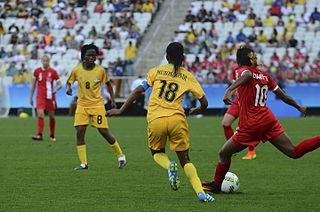
Sport in Zimbabwe has a long tradition and has produced many world recognized sports names and personalities. Football is the most popular sport, although rugby union, cricket, tennis, golf, and netball also have a following, traditionally among the middle class and the white minority. Field hockey is also played widely.
Zimbabwean Australians are Australian citizens who are fully or partially of Zimbabwean descent or Zimbabwe-born people who reside in Australia. They include migrants to Australia of people from Zimbabwe, as well as their descendants. Today, there are over 65,000 Zimbabwean Australians, with significant growth since 2000, coinciding with the sociopolitical crisis there.
New Zealanders of African descent represent less than 0.3% of New Zealand's population, although the number has been growing substantially since the 1990s.

Rugby union in Zimbabwe is a popular sport and ranks after association football and cricket as one of the oldest and most popular sports in the country. The Zimbabwe national team, commonly known as the Sables, have been playing international rugby since the early 1900s and have made appearances in two Rugby World Cups Zimbabwe at the Rugby World Cup on two occasions. As with rugby union in Namibia, the country's lack of a professional structure, and opportunity for player's to earn an income playing rugby, has been a problem for national organisers.
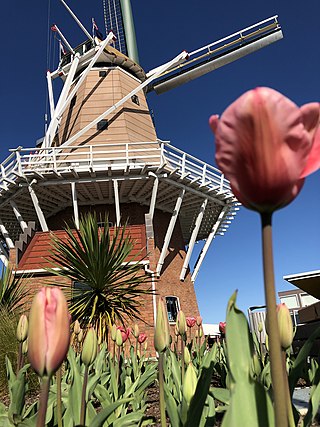
Dutch New Zealanders are New Zealanders of Dutch ancestry. Dutch migration to New Zealand dates back to the earliest period of European colonisation. The 2013 census recorded 19,815 people born in the Netherlands and 28,503 people claiming Dutch ethnicity.
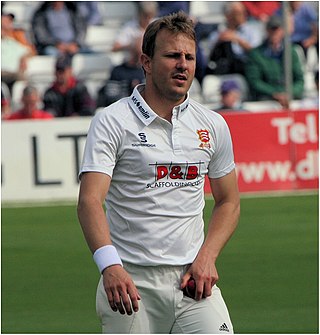
Neil Wagner is a South African-born New Zealand Test cricketer who plays for New Zealand and Northern Districts cricket teams. He played for Northerns until 2007/08 and Otago between 2008 and 2018. Wagner was a member of the New Zealand team that won the 2019–2021 ICC World Test Championship.

Rugby union has a long history in New Zealand. Today, New Zealand holds tier one status with World Rugby.
Zimbabwean Canadians are Canadian citizens of Zimbabwean descent or a Zimbabwe-born person who resides in Canada. According to the Canada 2016 Census there were 16,225 Canadian citizens who claimed Zimbabwean ancestry and 15,000 Zimbabwean citizens residing in the country at the moment of the census.
Kurt Heatherley is a professional rugby union player for Jersey Reds. He previously played rugby union for Auckland and played Australian rules football for the Hawthorn Football Club in the Australian Football League (AFL). A key defender originally from Tauranga in New Zealand, Hawthorn recruited him as a sixteen year old in 2011.
Afrikaners in Zimbabwe are the descendants of Afrikaans speaking migrants to Zimbabwe, almost all of whom originated from the Cape Colony, Orange Free State and Transvaal in modern South Africa. At their peak they formed 10-15% of white Zimbabweans, but only a small fraction of the greater population. Persons of Afrikaans heritage abound in Zimbabwean society particularly in sports such as cricket, rugby, agriculture, tourism, conservation and traditionally, farming, however few are recognized as such, as unlike South Africa the majority of Afrikaner people are now anglophone and seen as indistinguishable from other whites by greater society.
References
- ↑ "2018 Census ethnic group summaries | Stats NZ".
- 1 2 "Zimbabwean New Zealanders". Statistics New Zealand.
- ↑ "Lifeline offered to Zimbabweans".
- ↑ "Lifeline offered to Zimbabweans".
- ↑ "The Relationship Between Acculturation and Mental Health Among Black Zimbabweans Living in New Zealand" (PDF).
- ↑ "Zimbabwe's loss has been New Zealand's gain". 14 September 2019.